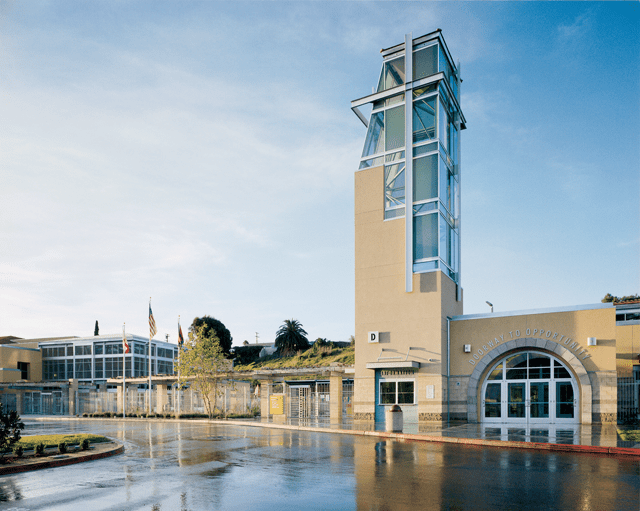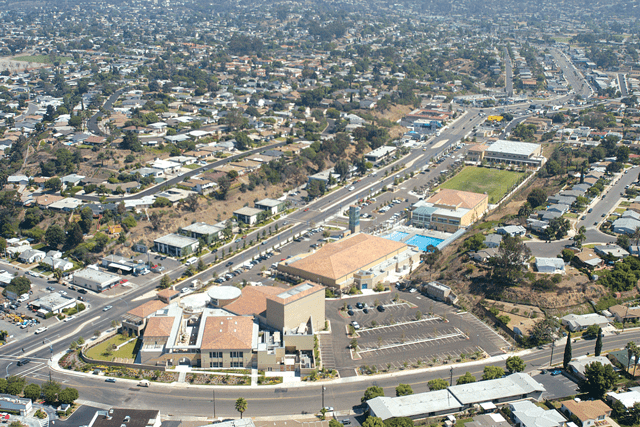New solar power project launches this month at The Salvation Army’s oldest Kroc Center.
By Alma Bahman –
The Salvation Army Ray and Joan Kroc Corps Community Kroc Center in San Diego, California, is nearing completion of a massive solar power renovation project to help the facility cut costs, become more energy efficient and direct more revenue to its various ministries.
Kevin Forrey has been following solar energy technology for years. As the facilities director of the 12.4-acre Kroc Center in San Diego, California—which includes five buildings, an ice skating rink, a rock-climbing wall, a pool, a gym, and more—keeping the lights on is a big part of his job.
“In the summer of 2016, I thought it was a good time to pull the trigger on getting solar panels,” Forrey said. “The technology was right.”
Solar technology has come a long way since it was first invented, and it’s now more accessible than ever. In 2016, the United States installed enough photovoltaic (PV) systems to provide 14.7 gigawatts of energy, bringing the country’s total capacity for solar energy to 40.3 gigawatts, according to the International Energy Agency. That makes the U.S. the country with the fourth largest PV capacity in the world. One gigawatt of energy powers about 1 million LED light bulbs.
The industry is booming, as the Solar Energy Industries Association projects the U.S. will surpass a capacity of 100 gigawatts of solar energy over the next five years. So Forrey and his team started the research phase.

In California, the first step to going solar is ensuring the site itself is already as energy efficient as possible, Forrey said. That includes replacing old appliances, such as water heaters, with energy-efficient models, maintaining proper insulation and replacing old light bulbs with LEDs. Then the utility company will conduct an audit to confirm that the building is operating at its greenest capabilities.
Next, Forrey and his team found a contractor and worked with the company to apply for rebates and permits and install the system on the roof of the Kroc Center. The project is in the commissioning stage, meaning it’s being tested and signed off on by the city and utility company. It’s expected to be up and running this month.
The entire process took about a year. But according to Forrey, it’ll be well worth it. Large buildings are expensive. Plus, they put a lot of pressure on the environment: they require a lot of electricity, water and other resources for heating and cooling.
“California has some of the highest energy costs in the nation,” Forrey said.
California’s average cost per kilowatt hour hit 17 cents across all sectors (residential, commercial, industrial and transportation) in June 2017, making it the third-most costly (outranked by Alaska and Hawaii).
The addition of 1,928 solar panels on three of the five buildings on the Kroc Center will save a projected 33 percent or $76,000 in electricity costs in the first year of operation. Harnessing energy from the sun instead of fossil fuels would be like removing 65 cars from the roads per year.
“Our electric bill was almost $629,000 in the last 12 months,” said Major Rick Peacock, Kroc Center Corps Officer. In the next 10 years, savings are projected to amount to $1 million, he said. The projected savings jump to $5 million over the next 25 years, which leaves about $200,000 per year on average to put toward the Kroc Center’s ministries.
“It fulfills a higher purpose to shift savings to direct services or mission emphasis,” Peacock said. “Using solar energy shows excellent stewardship of Army resources, as well as being good stewards of the environment.”
Peacock said the project also produced positive press and increased feedback from the community about going green. “These are direct benefits for the world our children will be living in, and it can take place while simultaneously helping the Kroc Center succeed,” he said.
The next step for the Kroc Center’s energy goals is battery storage to store unused solar energy for later use at peak times.
“I think we’ll be a good model for other centers going forward, once we get online,” Forrey said. “We’re kind of like the pilot project for this.”











